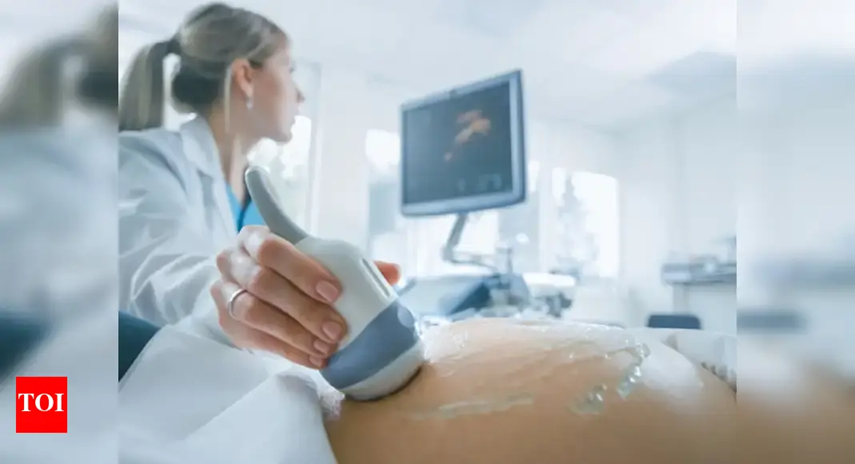
New Delhi: Medical experts have stressed raising awareness about Antenatal Hydronephrosis, a condition where fetus develops swelling in one or both kidneys due to urine buildup, saying it is a manageable prenatal condition with proper monitoring and care. Antenatal hydronephrosis can be detected in a fetus by ultrasound as early as the first trimester of pregnancy, doctors said.
Dr Shandip Kumar Sinha, the director of pediatric surgery and pediatric urology at Mednata-The Medicity in Gurugram said that pregnancy is a joyous time but it can also bring moments of concern, especially when an unexpected diagnosis arises during routine check-ups.
“Antenatal hydronephrosis is not a very uncommon disease. Out of every 100 pregnancies, one or two cases of this condition are detected,” Dr Sinha said.
With a rise in the number of antenatal scans being done, instances of antenatal hydronephrosis getting detected have also been increasing, he said.
Assuring parents, Dr Sinha said that if antenatal hydronephrosis is detected and proper medical intervention is made in the first five to six months of birth, the kidneys can heal completely.
Antenatal hydronephrosis is typically identified during routine ultrasound scans.
It occurs due to a partial obstruction in the urinary tract or a reflux of urine back into the kidneys. While some cases resolve naturally before or after birth, others may require medical intervention to prevent complications such as urinary tract infections or kidney damage.
“Advancements in prenatal imaging and pediatric urology have significantly improved our ability to diagnose and manage antenatal hydronephrosis,” said Dr Sinha.
“Early detection allows us to closely monitor the condition and take necessary steps to ensure the baby’s health and kidney function,” he added.
In mild cases, antenatal hydronephrosis often resolves on its own and does not require treatment. For moderate to severe cases, some additional tests including ultrasound, voiding cystourethrograms, or nuclear medicine scans, of the baby are done after birth to determine the severity of obstruction or reflux, Dr Sinha explained.
In rare instances, surgical intervention may be required to correct underlying issues.
Medical experts recommend expectant parents to work closely with their healthcare providers to monitor the condition and prepare for potential postnatal evaluations. Parents should also be aware of signs such as difficulty urinating, fever, or persistent kidney infections in newborns, which may indicate the need for medical attention.
Beyond immediate medical concerns, antenatal hydronephrosis can also bring emotional stress to families. Healthcare providers encourage parents to seek support from medical professionals, counsellors and support groups who can offer guidance and reassurance during pregnancy and after birth.
Research continues to shed light on the best approaches for managing antenatal hydronephrosis. Studies have shown that non-invasive prenatal monitoring techniques, combined with postnatal follow-ups, significantly improve outcomes.
Ongoing advancements in pediatric urology and nephrology continue to refine treatment strategies, making it possible for most affected infants to lead healthy, normal lives.
Public awareness campaigns and medical outreach programs aim to educate parents and caregivers about antenatal hydronephrosis and ensure they have access to necessary resources. Hospitals, healthcare organisations and advocacy groups are working to provide up-to-date information, connect families with specialists, and promote early intervention strategies.
Dr Prabudh Goel, additional professor, paediatrics surgery, at AIIMS-Delhi, said, “Antenatal hydronephrosis can be detected in a fetus by ultrasound as early as the first trimester of pregnancy. Prenatal intervention is almost never required, and amniotic fluid is usually normal. Depending upon the abnormality, ultrasound imaging may be needed throughout pregnancy and after a baby is born. In most cases, this diagnosis does not affect when, where or how a baby is delivered.”
“With appropriate follow-up and care, the majority of infants with antenatal hydronephrosis grow up healthy with normal kidney function,” he said.
“Of those that don’t, approximately half have no identifiable underlying cause that needs active management. These may remain stable or slowly improve with time. For babies found to have significant obstructive conditions, surgical treatment may be needed early or later to reduce damage to kidney function from pressure effects or infection,” Dr Goel said.
He added, “By raising awareness about this condition, we hope to reassure families that early detection and proper management can lead to positive outcomes.”

